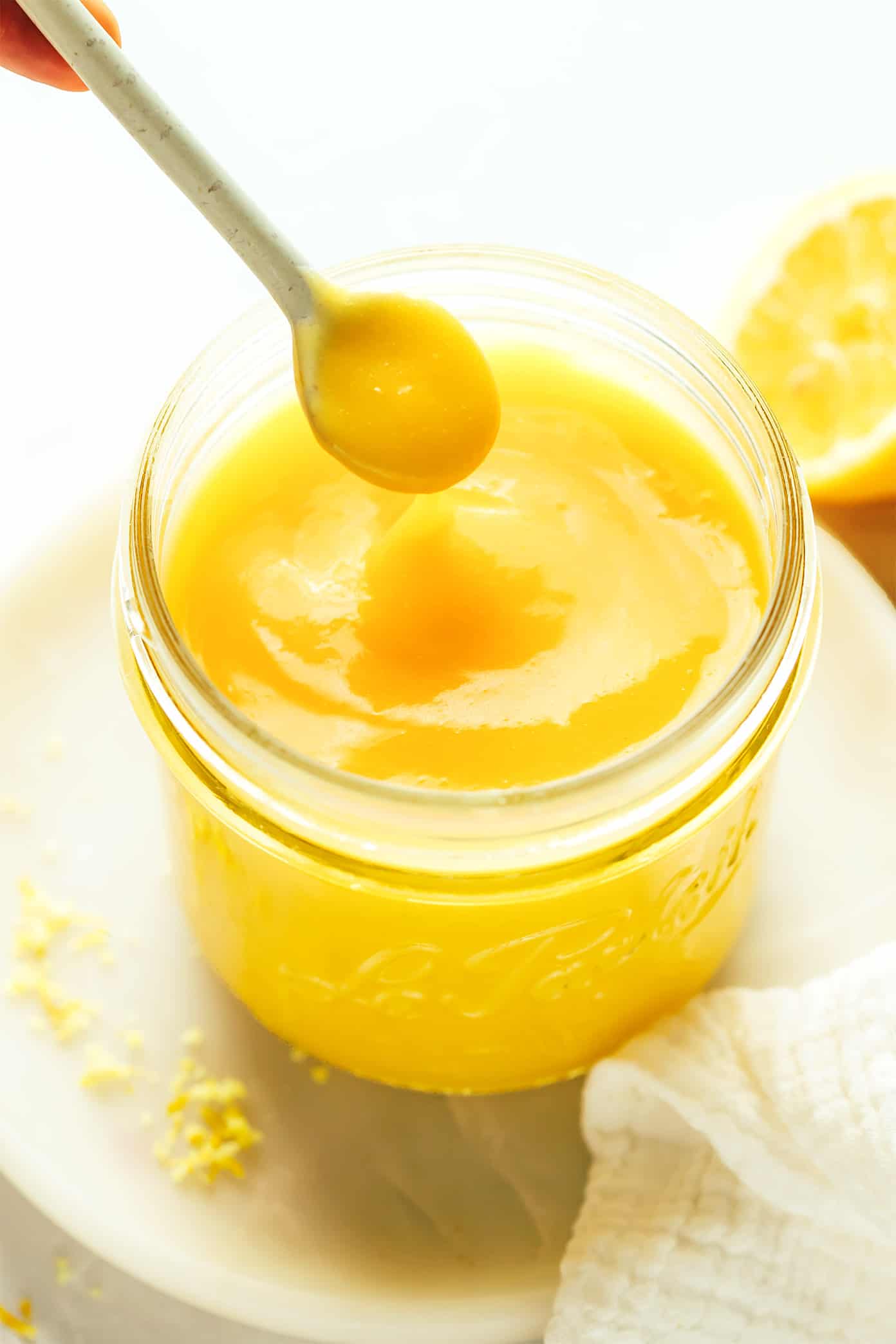This post may contain affiliate links. Please read my disclosure policy.
This classic homemade lemon curd recipe is easy to make with 5 ingredients in about 15 minutes.

I’m usually all for store-bought shortcuts. But when it comes to lemon curd, I wholeheartedly believe it’s worth the extra time and effort to make a quick batch homemade. Flavor-wise, there’s just nothing compares to the bright, zingy flavor that fresh lemon juice and zest add to a batch of homemade lemon curd. Plus, it’s so easy to make! ♡
All you need are 5 ingredients to make a quick batch — lemons, eggs, sugar, salt and butter. The recipe comes together quickly and easily on the stovetop with minimal fuss. And after just 15 minutes or so of hands-on prep time, a jar of this irresistibly creamy, tart, sweet, velvety spread can be yours to enjoy.
Spread this homemade lemon curd on anything from bagels to biscuits, croissants, muffins, pancakes, scones, toast, waffles and more. Use it to fill cakes, cookies, cream puffs, crêpes, macarons or meringues. Swirl it into your ice cream or yogurt, use it to top a cheesecake or pavlova, serve a little jar with your next charcuterie board, or hey, if you feel like sharing, wrap a little jar up for gifting! The are endless delicious ways to enjoy a good jar of homemade lemon curd.
So grab some fresh lemons and let’s make a quick batch!

Lemon Curd Ingredients
Here are a few brief notes about the classic lemon curd ingredients that you will need to make this recipe:
- Lemons: It’s important to use fresh lemons for this recipe, since we will be using both the zest and juice to add so much delicious lemony flavor. I recommend purchasing organic lemons when making lemon curd, since we will be using so much zest, but any fresh lemons will do.
- Sugar: I recommend either cane sugar or basic white granulated sugar when making lemon curd.
- Eggs: We will use a combination of 2 whole eggs plus 4 egg yolks for this recipe, which will serve to thicken the mixture.
- Butter: Butter is always stirred into lemon curd after it comes off of the stove, and adds the most wonderfully creamy, velvety, richness to the curd. Be sure to use cold butter so that it will properly emulsify into the sauce.
- Salt: Finally, don’t forget to add salt to bring out the best of all of these tart, sweet, creamy flavors!

Tips for Making Lemon Curd
Full instructions are included in the recipe below for how to make lemon curd, but here are a few helpful tips to also keep in mind:
- Use fresh lemon juice. It’s worth reiterating that this recipe is so much better made with fresh lemon zest and juice. So avoid the temptation to use bottled lemon juice as a shortcut — it’s well worth the extra effort to use fresh lemons! I highly recommend a Microplane for zesting and this citrus juicer for easy juicing.
- Cook the lemon curd low and slow. We intentionally want to cook the lemon, eggs and sugar mixture slowly over medium-heat so that the eggs do not scramble. This process really cannot be rushed, so take your time, whisk constantly, and doing so should avoid any scrambling. (But if some of the eggs do scramble, don’t worry at all — you can easily sift them out with a strainer once the lemon curd has cooked.)
- Use non-metallic equipment. Eggs and lemon juice can sometimes react with metal cooking equipment and give lemon curd a slightly metallic flavor. I’ve personally made this recipe a number of times using my usual stainless steel saucepan and whisk and have never noticed a problem. But if you’d like to play it safe, opt for a non-metallic saucepan or double boiler and use a silicone whisk.
- Consider a double boiler. If your stove tends to overheat or heat unevenly, it would be safer to make this recipe using a double boiler so that the eggs do not accidentally overheat and scramble.
- Be sure to cover while chilling. A film will naturally form on top of lemon curd as it is cooling, which is safe to eat and tastes just fine. But if you would like to avoid that layer and preserve the smooth texture, simply press a piece of lightly-oiled parchment or plastic wrap directly on top of the lemon curd to cover as it is cooling. Then you can remove it once the curd has cooled.

Recipe Variations
Here are a few of my favorite lemon curd variations that you may enjoy:
- Use a different citrus fruit: Use another citrus such as lime, grapefruit, Meyer lemon, or orange (such as navel orange, blood orange, mandarins, tangerine) in place of the lemon. Although technically, you can make a curd from any fresh fruit! Proportions may need to be adjusted once you veer away from citrus, but fresh blackberry, blueberry, cranberry, kiwi, mango, passion fruit, raspberry, strawberry, watermelon, or a mix of different fruits could all be delicious.
- Add extra mix-ins: Add a hint of ginger, vanilla extract, almond extract, or spices (such as cinnamon, cardamom, black pepper) to the curd.
- Add herbs: Muddle or add some finely chopped fresh herbs to the curd (such as mint, basil, rosemary or thyme).

Ways To Use Lemon Curd
There are sooo many delicious uses for lemon curd, so don’t hesitate to get creative when it comes to putting a batch to use! For example, lemon curd would be wonderful used as a:
- Spread for bagels, biscuits, bread, crepes, croissants, English muffins, pancakes, scones, toast, waffles and more
- Filling for cakes, cookies, cream puffs, crepes, macarons, meringues or trifle
- Topping for a cheesecake or pavlova
- Sauce to be tossed with a fresh fruit salad
- Dip for charcuterie board
- Swirl stirred into ice cream or yogurt
Lemon Curd FAQ
Why is it called lemon curd? It comes from the term ‘curd’, which is the process of thickening milk with an acid. In the case of lemon curd, it’s the lemon juice that causes the milk to thicken. Modern lemon curd is not technically a curd.
Can you freeze lemon curd? Yes! You can freeze lemon curd for up to 3 months in an airtight container. Just be sure to let the frozen lemon curd thaw in the fridge overnight before trying to serve so that its texture is preserved.
Do you really need to strain lemon curd? This step is totally up to you. If you happen to notice that it doesn’t look completely smooth or a few small bits of eggs seem to have scrambled while cooking, you can strain the mixture through a fine mesh strainer. But I often skip this step myself.
Why did my lemon curd split? Most likely the butter was not cold and it did not emulsify properly into the mixture. Or it could be that the eggs were cooked too quickly or at too high a temperature and scrambled, preventing them from serving as a binding agent for the curd.
How thick is lemon curd supposed to be? Lemon curds can vary in thickness, depending on how much butter you add, but should always be soft and thin enough to spread. When cooking the lemon curd, just keep in mind that it should be able to coat the back of a wooden spoon (this happens around 170°F), then it will thicken more as it cools.
- 1 cup cane sugar (or white granulated sugar)
- 3/4 cup freshly-squeezed lemon juice + 2 tablespoons lemon zest
- 1/4 teaspoon fine sea salt
- 2 large eggs + 4 large egg yolks
- 6 tablespoons unsalted cold butter, cut into small pieces
- Cook. Whisk all of the ingredients except butter in a small saucepan or double boiler until evenly combined. Cook over medium heat, whisking constantly, until the mixture reaches 170°F. (This is the temperature at which it will thicken. If you don’t have a thermometer, the consistency of the mixture should coat the back of a wooden spoon.)
- Add butter. Remove the pan from the heat. Immediately add in the butter and whisk until melted and evenly combined.
- Strain (optional). If you would like your lemon curd to be extra smooth (especially if you notice that any small bits of eggs have scrambled while cooking), strain the mixture through a fine mesh strainer.
- Chill. Transfer the lemon curd to a heat-safe jar or bowl. Press a layer of parchment (lightly misted with cooking spray) or plastic wrap directly onto the surface of the lemon curd, which will prevent a film from forming. Refrigerate for at least 1 hour or until chilled.
- Serve. Serve and enjoy! Leftover lemon curd can be refrigerated in a sealed container for up to 1 week.





